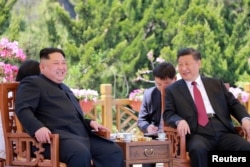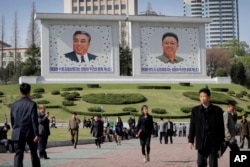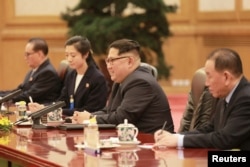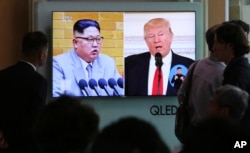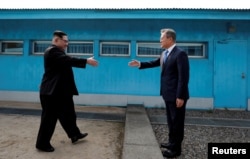Analysts say Chinese President Xi Jinping’s second meeting with North Korean leader Kim Jong Un a little more than a month from now is a sign of just how anxious Beijing is about a nuclear deal on the Korean Peninsula and the impact an agreement could have on its strategic interests.
In late March, the two made history by secretly meeting in Beijing after years of silence and mounting animosity. Kim took a train to the Chinese capital. The visit was not officially confirmed until it was over.
They met again earlier this week, and this time Kim made a rare decision to travel by airplane to the nearby Chinese coastal city of Dalian to meet with Xi. Once again, the meeting was not confirmed until it was finished.
China’s state media have portrayed the meetings as cordial and well-planned, highlighting how the talks have emphasized both sides’ shared strategic interests and the North’s commitment to denuclearize.
However, some analysts take a different view, arguing that the meetings were rushed and haphazard.
“The interesting difference between the first emergency meeting and the second is that even though Xi was incredibly busy at this time, he still ran over to near the Korean border to meet with Kim,” Ding said. “And Kim did the same, setting a new precedence because he doesn’t dare to fly and yet he did!”
Kim’s father and grandfather rarely flew. The two witnessed the explosion of their exclusive jet in mid-air in 1982 and some argue that may be why they used other modes of transportation such as trains more frequently. Kim Il Sung flew to Moscow in 1986 for an urgent meeting with Michael Gorbachev, but for that trip he used a Russian pilot.
Oh Ei Sun, a senior fellow at the S. Rajaratnum School of International Studies in Singapore said the flurry of visits, not only between Kim and Xi, but also by Secretary of State Mike Pompeo, who was in Pyongyang Wednesday, reminds him of the shuttle diplomacy during the Palestinian Israeli crisis in the 1970s.
Oh said that while it is unclear what urgent issues the two needed to discuss, the broader aim is to have a comprehensive mechanism in place prior to the summit between Kim and President Donald Trump.
“I think it is basically to set the stage for an eventual settlement of the Korean peninsula nuclear crisis because now there is a momentum to do so,” he said.
The frequency of the meetings also highlights how the North is sailing into uncharted waters as it looks toward a possible peace agreement to end the Korean War after decades and complete denuclearization sits on the horizon.
Ding suspects China is advising the North to take a slow approach when it comes to denuclearization.
For example, he speculates, Beijing may be advising the North to let inspectors into the country but not take them to its most recently used nuclear test sites. Instead, they may be suggesting Pyongyang take inspectors to older sites and demand that in exchange the United States remove its Terminal High Altitude Area Defense missile system from the South, he said.
“Because that is something that China sees as a real headache. China is adding bargaining chips from behind the scenes,” Ding said.
The meeting also may have been called because of President Trump’s decision to withdraw from the Iran nuclear deal. Analysts said that if Trump can withdraw from that deal, Kim (who has yet to sign a deal) is facing even more challenges than before.
“Kim is unsure about how big of a concession Trump will ask him to make. Obviously, Trump won't be satisfied with an agreement with North Korea that is similar to the Iran Nuclear Accord. Trump won't be happy with such a deal, [he wants more.]," Ding said.
President Trump’s initial acceptance of Kim’s invitation to a one-on-one summit caught many by surprise, Beijing included. But since then, China has moved quickly, stepping up its communications and meetings with North Korean officials as well as Washington, Tokyo, Seoul and Moscow.
Xi met with Kim before and after his recent summit with South Korean leader Moon Jae-in and is expected to travel to North Korea after its leader meets with President Trump.
Shortly after this week’s secret get together was publicized, Hu Xijin, the editor-in-chief of China’s party backed Global Times posted this note on Twitter, which is blocked in China.
“Xi and Kim met twice in some 40 days. The message is clear: No matter which country North Korea holds summit with, China is inside, not outside the room,” Hu wrote.
Analysts say the venue of the summit may a problematic issue, after reports said President Trump and Mr. Kim could be planning to hold their historic meeting in Singapore. The city-state has hosted sensitive leadership talks in the past, such as some between Taiwan and China, but observers said its close ties to the United States could be a source of suspicion for Beijing.
Brian Padden contributed to this report from Seoul.





